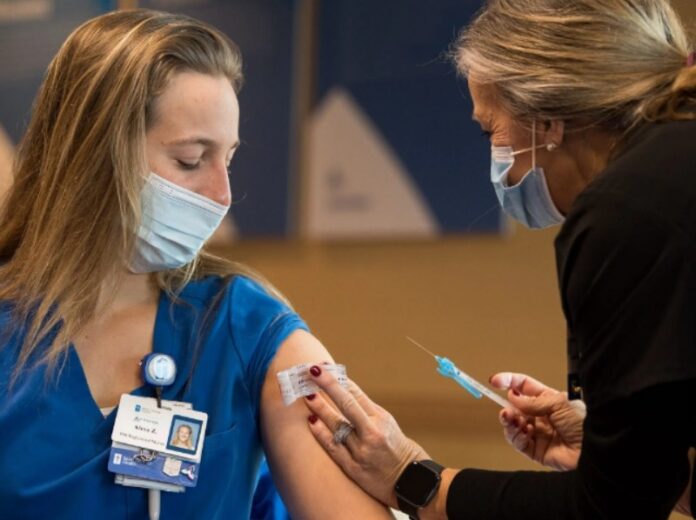
With vaccinations for COVID-19 underway, many are looking to have life return to something more like the old normal. While there is that anticipated light on the horizon, first a lot of people are going to need to take the vaccine to achieve what experts are calling “herd immunity”. The World Health Organization defines herd immunity as the point where a population can be protected from a certain virus if a threshold of vaccination is reached.
The first vaccine arrived in Rutherford County Christmas week, and the vaccine is now being administered to healthcare workers, first responders, residents and staff at long term care facilties and adults who cannot live independently (known as groups 1a1 and 1a2) and seniors 75 years and older.
According to the Rutherford County Health Department, they are now taking appointments for vaccinations for those falling within these categories.
In order to receive the vaccination, you have to complete a questionnaire to ensure you fall within the Tennessee COVID Vaccination Plan’s current phase. Anyone who does not fit the criteria will have their appointment canceled. To sign up, click here.
Appointments have filled up very fast; however, new times are being added as more vaccine becomes available. As more phases open up, more information will be available. Learn more on the Rutherford County Health Department website.
You can click here to access an online tool that will show you when you are eligible to receive the COVID-19 vaccine.
Managing the distribution of vaccine allocations to the public is a multi-step process. The new COVID-19 vaccination plan, which came out on December 30, outlines the qualifications for each phase.
The new vaccination plan is as follows:
 Hospital workers and those on the front lines are currently getting vaccinated through their employers, the health department, or a partnering hospital. But according to the state’s website, “Staff members and residents of long-term care facilities will be provided vaccinations through the federal partnership with Walgreens and CVS, in partnership with a local pharmacy or via Tennessee Department of Health vaccination strike teams. Phase 1a1 and 1a2 individuals should check with their employer or contact their local health department for more information.”
Hospital workers and those on the front lines are currently getting vaccinated through their employers, the health department, or a partnering hospital. But according to the state’s website, “Staff members and residents of long-term care facilities will be provided vaccinations through the federal partnership with Walgreens and CVS, in partnership with a local pharmacy or via Tennessee Department of Health vaccination strike teams. Phase 1a1 and 1a2 individuals should check with their employer or contact their local health department for more information.”
As a part of the task force, State Senator Shane Reeves explained what the group considered when putting the list of eligibility together. “Tennessee’s plan was developed after careful review of the National Academies of Sciences, Engineering and Medicine’s Framework for Equitable Allocation of COVID-19 Vaccine, guidance from the Centers for Disease Control and Prevention, recommendations from the Advisory Committee on Immunization Practices, and in consultation with the Governor, the Unified Command Group, and a stakeholder group of more than thirty organizations, offices and associations.”
The revised guidelines are a response to get teachers and others in high-risk occupations that require potentially dangerous personal interactions their vaccinations faster.
During the month of December, thousands of high-risk healthcare workers received their initial vaccinations with few reactions. Only 10 people in over 1.9 million who have been vaccinated have had anaphylaxis, according to the CDC. The CDC is currently monitoring all reactions on their Vaccine Adverse Reporting System (VAERS).
In an article Reeves wrote for The Tennessean in early November, he noted his concern about the fear factor that seems to be growing around the safety of the vaccine. “In a recent Tennessee state survey, 54.6% of participants said they were somewhat hesitant about getting the COVID-19 vaccine, and 24.5% admitted they probably won’t or will not receive the vaccine,” said Reeves. “This is troubling as the U.S. has never been able to achieve herd immunity without a vaccine…If we want to get our lives back, if we want jobs back and businesses to open for good, if we want to get back to any semblance of normal, we must get as many people vaccinated as possible.”
Even with the massive vaccinations, wearing a mask, continuing to social distance, staying home if exposed or infected with COVID-19, and getting tested to ensure everyone’s safety will be important until we reach herd immunity. And experts do not currently know what percentage of the population will need vaccination to achieve this immunity for COVID-19.
In the meantime, other aids in the fight against COVID-19 are arriving on the market. “Point-of-care (POC) testing can be a useful component in the SARS-CoV-2 (COVID-19) outbreak response,” added Reeves. “The FDA continues to review new tests and technologies as they are available.”















